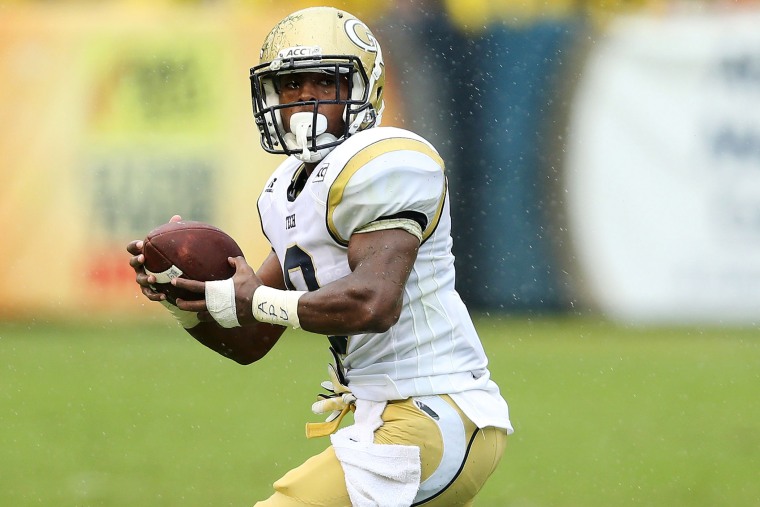Last fall, a small act of defiance sent tremors through some of America's premier college football teams. Players from Northwesten University, Georgia Tech and University of Georgia took to the field wearing wristbands that had "APU" written on them. The sartorial decision prompted a swift backlash from the head coaches at Georgia Tech and Northwestern, the latter of whom warned participating players to "keep things in a team context."
"APU" stands for All Players United, a slogan meant to reflect college athletes' demand for better medical coverage and other benefits. The wristbands were a silent protest organized by the National College Players Association (NCPA), a non-union labor group which has been organizing against the National College Athletics Association (NCAA) on those issues.
In a fall 2013 interview with msnbc, NCPA founder Ramogi Huma described that silent protest as "the very first step." The next step came this week, when the NCPA and college football players from Northwestern University started a legal battle over their alleged right to form a union.

On Tuesday, Huma filed a representation petition with the Chicago office of the National Labor Relations Board (NLRB), requesting the right for Northwestern football players to hold a union election. On Wednesday, NLRB Regional Director Peter Sung Ohr kicked off a hearing to determine whether the players have a legal right to union representation under the National Labor Relations Act. A spokesperson for the Chicago regional office told msnbc that Ohr will rule on the decision within the next month, after hearing arguments from the attorneys representing Northwestern University and the football players. The United Steelworkers union is covering the NCPA's legal fees.
Martin Malin, an expert in labor law and professor at the Illinois Institute of Technology, said that the players would "have a really tough row to hoe under current legal doctrine."
"In order for that petition to be valid and result in an election, they have to be employees, and that's the issue the region is currently holding a hearing on," he said. The NCAA insists that college football players are "student-athletes" instead of employees, meaning that they are not entitled to many of the labor rights which American workers enjoy under the National Labor Relations Act—including the right to form a union.
"This union-backed attempt to turn student-athletes into employees undermines the purpose of college: an education," said NCAA chief legal officer Donald Remy in a statement. "Student-athletes are not employees, and their participation in college sports is voluntary. We stand for all student-athletes, not just those the unions want to professionalize."
Even if the regional director rules in favor of the Northwestern players, it could be years before they manage to reap any of the benefits. Northwestern University can always appeal to the NLRB itself in Washington, D.C. If the players somehow manage to win a favorable ruling from the NLRB and hold a successful union election, the fight could still go on through other means.
"I would assume at that point the university would want to contest the determination that they [the players] are employees in court," said Malin. "And to do that, the university would refuse to meet with the union. That would prompt the union to file an unfair labor practice charge alleging that the university refused to bargain in good faith." If the NLRB decides that the players have a legitimate claim, then the case goes to a court of appeals.
The path to an NLRB-certified election and union contract is so long and treacherous that it may not seem worth it for the Northwestern players. But bringing their case before an NLRB regional director also has other, immediate effects: It puts their campaign back in the public eye, adding to the pressure on Northwestern, the NCAA and its affiliate members to strengthen benefits for college athletes.
"I see this effort as more aimed at really bringing public attention to the substantive issues they're raising," said Malin. "Even if they don't have a legal right under the National Labor Relations Act to form their organization and compel their university to bargain with them, there's nothing prohibiting that. So there may also be an effort to mount public pressure on the university to recognize them in some other way."
